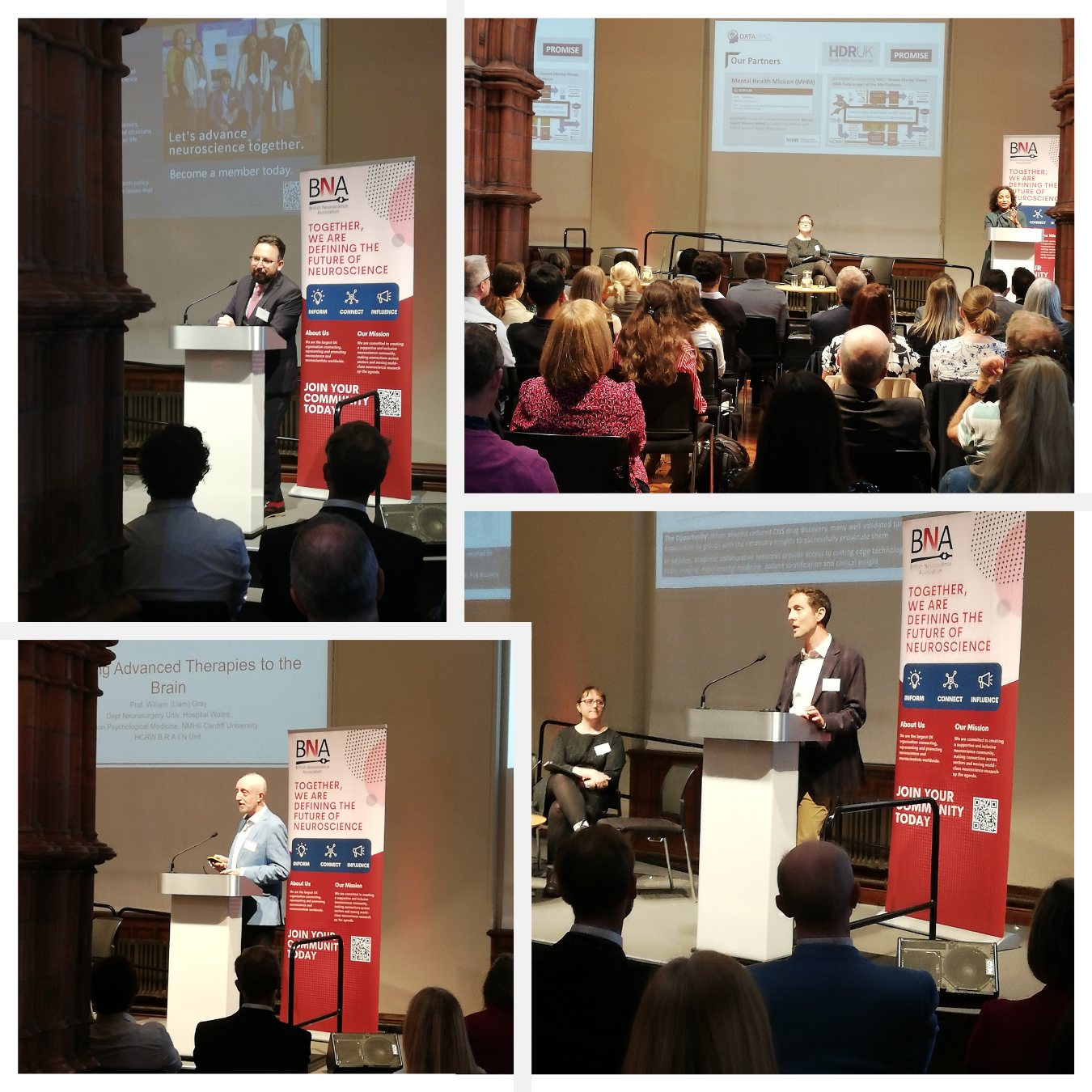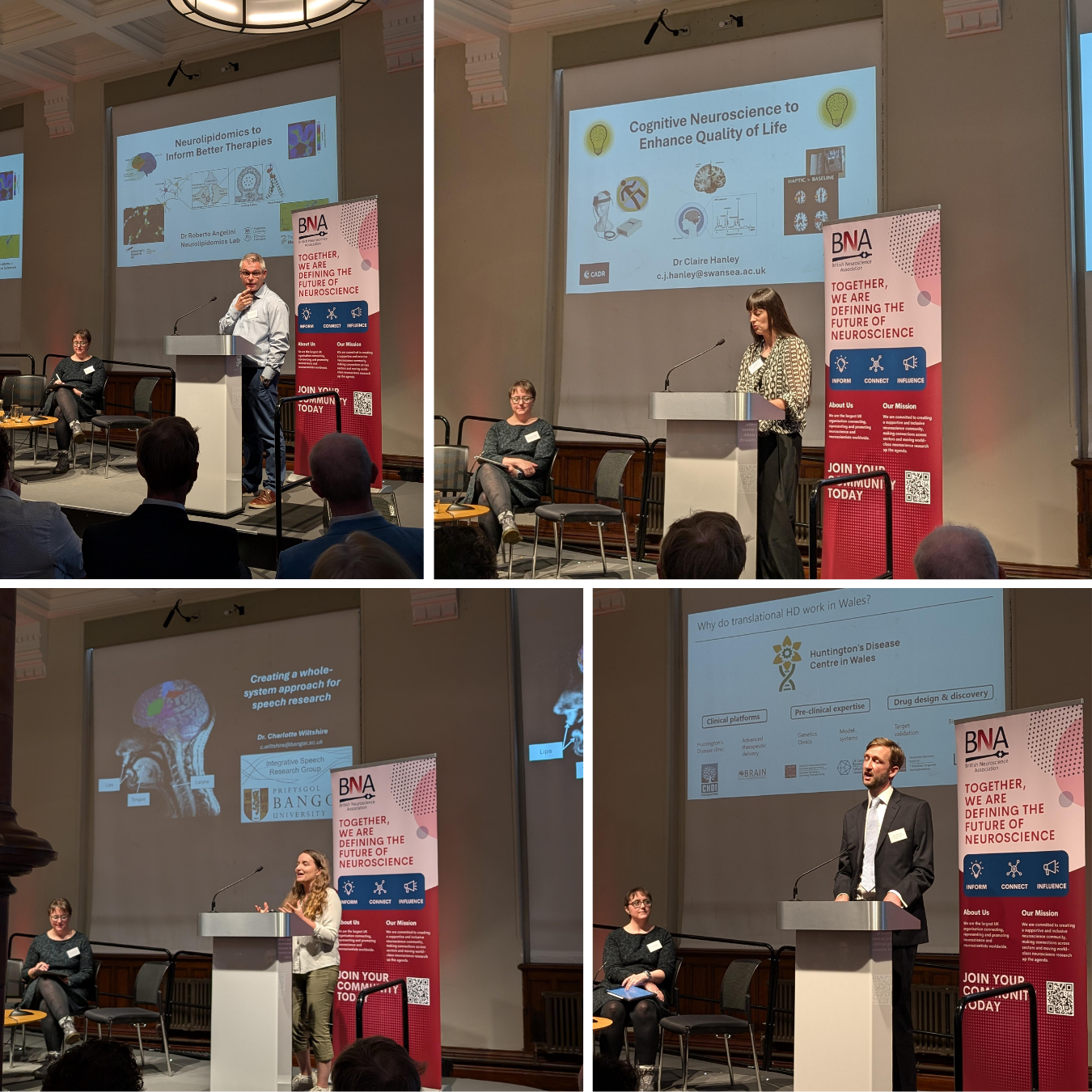BNA Annual General Meeting 2025
1st April 2025
20th Sep 2024
On 17th September 2024, The British Neuroscience Association (BNA) held an invitation only event at the Senedd, sponsored by Hefin David MS (Caerphilly) to raise the profile of neuroscience amongst policy-influencers in Wales, and to highlight the vital importance of neuroscience research in helping tackle key health challenges in Wales in the future.
The event brought together academics, clinicians and politicians together with research funders, charities and industry to showcase the breadth of neuroscience research that’s happening across Wales.

Views from the Senedd, the heart of Welsh government
Professor Tara Spires-Jones, President of the BNA, welcomed delegates by outlining the fundamental role neuroscience research plays in developing new approaches to address both clinical and social needs.
Tara said: “This event provided a fantastic opportunity to discuss the strengths and challenges of neuroscience research in Wales and how the BNA can work with this vibrant community to further enhance the impact and success of Welsh neuroscience in the future.”
Hefin David MS opened the session with heartfelt thanks to the neuroscience community for advancing our understanding of the brain towards better help and treatments for those living with neurodevelopmental conditions, a topic that is close to his heart.
He said: “I’m very grateful to be a part of this event and for all the work this group of people are putting in to learning about the brain, particularly when it comes to Autism. My 8 year old daughter Caitlin is autistic and to know the level of care and research that is going into this area brings me great comfort and hope for the future”.

Clockwise: Sponsor Hefin David MS (Caerphilly) opening the event, Professor Ann John (Swansea University), Professor Simon Ward (Cardiff University) and Professor Liam Gray (Cardiff University).
The first of our Research Spotlights featured Professor Simon Ward from Cardiff University’s Medicines Discovery Institute, highlighting the thriving drug discovery ecosystem in Wales. Since its inception, the Institute has raised over £50 million in research funding, with a focus on translating advances in mental health from bench to bedside.
Next, Professor Ann John from Swansea University showcased DATAMIND, a major collaboration involving 14 UK universities to drive mental health research. Her team partners with industry and national initiatives like UKDRI and the UK Government’s Mental Health Mission, leveraging data-driven insights to enhance neuroscience research.
Then, neurosurgeon Professor Liam Gray emphasized Wales' strong research ecosystem, which drew him to select the country as the place to establish his work leading advanced brain therapy trials. His Cardiff-based team is among only five global centers delivering UniQure AMT-130 gene therapy for Huntington's disease.

Clockwise: Dr. Roberto Angelini (Swansea University), Dr. Clare Hanley (Swansea University), Dr. Tom Massey (UKDRI, Cardiff University) and Dr. Charlie Wiltshire (Bangor University).
The event also featured rapid-fire research talks, providing quick insights into cutting-edge neuroscience from universities and NHS trusts across Wales:
The event underscored Wales’ leadership in mental health and neuroscience, showcasing collaboration and innovation at the forefront of research.

Top left: Delegates in the iconic Pierhead building at the heart of Welsh government; Top right: BNA President Prof Tara Spires-Jones and Chief Executive Dr Laura Ajram with panellist and BNA award winner, Prof Julie Williams; Bottom: Panellists left to right – Mark Isherwood (MS/AS North Wales/Gogledd Cymru), Prof Penny Lewis (CUBRIC, Cardiff University), Shelley Elgin (Director of the MS Society Cymru and Co-Vice Chair of the Wales Neurological Alliance (WNA)), Prof Kim Kendall (Centre for Neuropsychiatric Genetics and Genomics, Cardiff University), Prof Julie Williams (UKDRI, Cardiff University) and chair Prof Lawrence Wilkinson (NMHII, Cardiff University) discuss ‘How is Wales Uniquely placed to be a world-leader of neuroscience research?'
The event concluded with an esteemed panel of researchers, politicians and charity leaders, led by Prof Lawrence Wilkinson, Co-Director of the Neuroscience and Mental Health Innovation Institute, Cardiff University, discussing how Wales is uniquely placed to be a world-leader of neuroscience research. Referencing the showcase of innovative research from our spotlight presentations, the panel agreed that Welsh research institutions are at the forefront of innovation across the breadth of neuroscience and mental health research with a depth of expertise in basic mechanisms of neurodegenerative diseases.
The panel highlighted that the collaborative culture and extensive networks and partnerships between Welsh research institutions, NHS, charities and industry encourages and facilitates translation from bench to bedside, with many notable examples of academic research translating to clinical trials. When it comes to supporting spin outs and new commercial ventures however, the panel felt Wales was currently well suited to supporting existing companies, and more support was needed to encourage innovative businesses to set up and stay in Wales.
With world-leading research institutions, internationally renowned experts, and cutting-edge facilities, Wales is driving global advancements in understanding and treating complex brain conditions. The BNA is committed to supporting this progress by raising the profile of the vital research being carried out by our members and advocating for neuroscience and neuroscientists across the UK.
Following this successful event, we look forward to continuing to build strong relationships with the Welsh government, ensuring that the needs of our members and the wider neuroscience community are heard and championed at the highest levels.